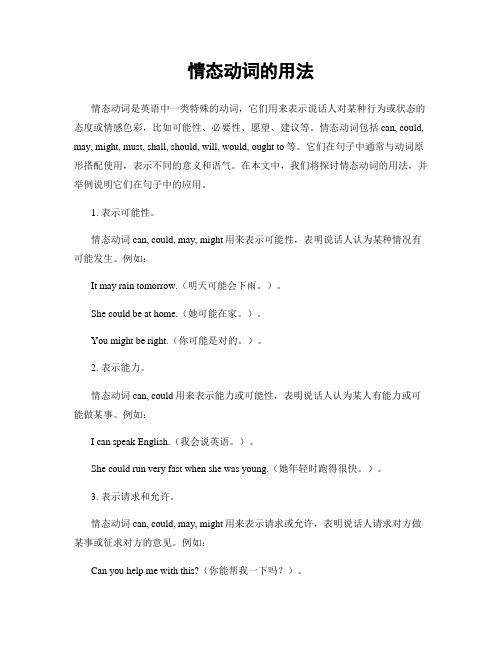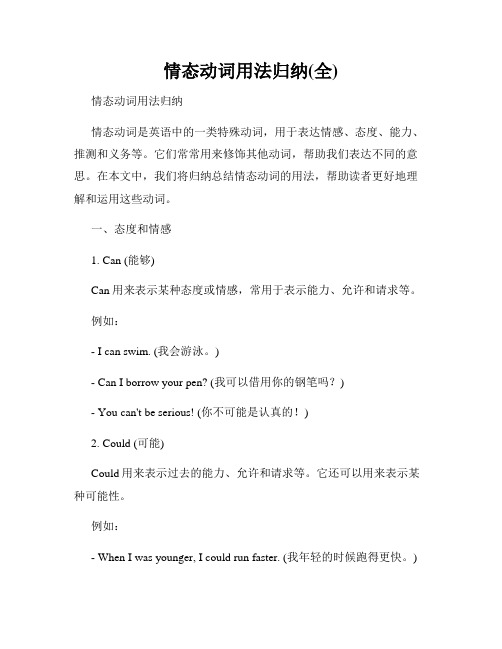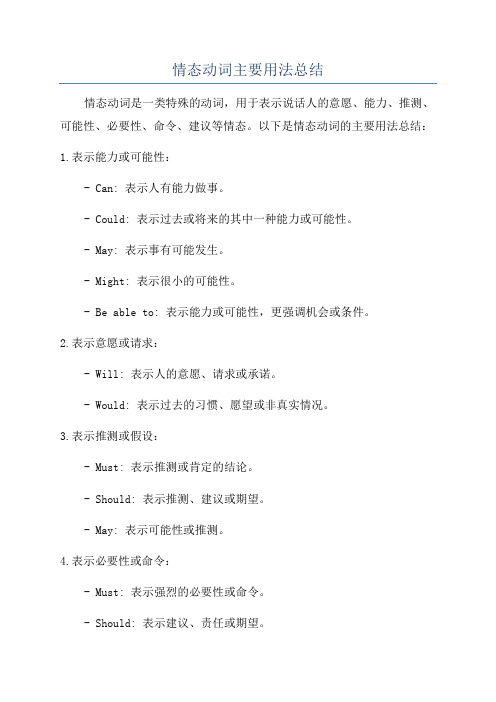情态动词的用法
情态动词用法

情态动词情态动词是一种本身有一定的词义, 表示说话人的情绪,态度或语气的动词, 但不能单独作谓语, 只能和其他动词原形构成谓语。
在句中通常放在谓语动词之前, 谓语动词前若有助动词, 则在助动词之前;若在疑问句中, 情态动词则在主语之前。
情态动词无人称和数的变化, 情态动词后面跟的动词需用原形, 否定式构成是在情态动词后面加 "not"。
个别情态动词有现在式和过去式两种形式, 过去式用来表达更加客气, 委婉的语气, 时态性不强, 可用于过去,现在或将来。
情态动词的用法1.can (could)1) 能, 会 (表示能力 = be able to, could主要指过去时间)He listened, but could hear nothing.They can’t swim.2) 可能, 会 (表示怀疑或不确定性, 用于否定, 疑问, 或感叹句; 表示可能)It can’t be true.How can you be so careless!He can’t finish his work.3) 可以 (表示允许、许可, 但不如may 正式)—Can I smoke here?—Of course, you can.Can I use your new mobile phone?4) 辨析 can / be able to形式上: can 只有两种时态can / could, 但是be able to 有很多种。
I shall be able to tell you about it tomorrow.Mike can play the violin. He has been able to play it since he was 6.She has not been able to come to school for a whole week.在过去时中,could经常表示理论上或一般能够做某事,而was / were able to则表示事实上或具体做到了某事。
情态动词的用法

情态动词的用法情态动词是英语中一类特殊的动词,它们用来表示说话人对某种行为或状态的态度或情感色彩,比如可能性、必要性、愿望、建议等。
情态动词包括can, could, may, might, must, shall, should, will, would, ought to等。
它们在句子中通常与动词原形搭配使用,表示不同的意义和语气。
在本文中,我们将探讨情态动词的用法,并举例说明它们在句子中的应用。
1. 表示可能性。
情态动词can, could, may, might用来表示可能性,表明说话人认为某种情况有可能发生。
例如:It may rain tomorrow.(明天可能会下雨。
)。
She could be at home.(她可能在家。
)。
You might be right.(你可能是对的。
)。
2. 表示能力。
情态动词can, could用来表示能力或可能性,表明说话人认为某人有能力或可能做某事。
例如:I can speak English.(我会说英语。
)。
She could run very fast when she was young.(她年轻时跑得很快。
)。
3. 表示请求和允许。
情态动词can, could, may, might用来表示请求或允许,表明说话人请求对方做某事或征求对方的意见。
例如:Can you help me with this?(你能帮我一下吗?)。
Could I use your pen?(我可以用一下你的笔吗?)。
May I come in?(我可以进来吗?)。
4. 表示必要性。
情态动词must, should, ought to用来表示必要性或建议,表明说话人认为某种行为是必要的或值得做的。
例如:You must finish your homework before you go out to play.(你必须在出去玩之前完成作业。
)。
You should apologize to her.(你应该向她道歉。
14个情态动词及其用法

14个情态动词及其用法14个情态动词及其用法如下:1.can:表示能力,用于疑问句或否定句中表示惊异、怀疑、不相信等态度。
如:Can you speak English?你会说英语吗?2.could:表示过去的能力或可能性。
表示惊异、怀疑、不相信等态度时,可用could。
如:Could you have done this?你真的能做到这个吗?3.may:表示可能性。
用于请求、允许、祝愿等场合。
如:May I borr ow your book?我能借你的书吗?4.might:表示可能性,比may更委婉。
如:Might I have your attenti on,请大家注意。
5.must:表示肯定、确定,用于陈述事实或推测。
如:The game must be over,比赛应该结束了。
6.need:表示需要、必要性。
如:We need to finish this task today。
我们今天需要完成这个任务。
7.ought to:表示应该、应当,用于表示道义上的责任或推测。
如:Yo u ought to help him,你应当帮助他。
8.dare:表示勇气、敢。
如:Dare you jump off the bridge?你敢从桥上跳下去吗?9.shall:表示询问、承诺、威胁等。
如:Shall we start?我们开始吗?10.will:表示将来、意愿、决心等。
如:I will finish this work on ti me.我会按时完成这个工作。
11.had better:表示建议、警告。
如:You had better hurry,你最好快点。
12.have to:表示被迫、必须。
如:I have to go to work,我必须去上班。
ed to:表示过去经常发生的动作或状态,也可表示习惯或倾向。
如:He used to smoke,他过去经常抽烟。
14.shouldn't:表示不应该,用于否定句中表示建议、批评等。
情态动词用法

情态动词用法情态动词是英语中的一类特殊动词,用来表示说话人对某种行为或状态的态度、推测、能力、可能性、建议等。
情态动词常常和动词原形搭配使用,具有一些特殊的语法和用法规则。
本文将详细介绍情态动词的基本用法和几种常见的情态动词。
一、情态动词的基本用法1. 表示能力:情态动词可以用来表示能力或技能。
常见的能力情态动词有can和could。
例如:- I can swim.(我会游泳。
)- She could play the piano when she was young.(她小时候会弹钢琴。
)2. 表示可能性:情态动词可以表示某种行为或状态的可能性。
常见的可能性情态动词有may、might和could。
例如:- It may rain tomorrow.(明天可能会下雨。
)- I might go to the party tonight.(我可能会去参加今晚的聚会。
)- He could be late for the meeting.(他可能会迟到会议。
)3. 表示推测:情态动词还可以用来表示说话人对某种事实的推测。
常见的推测情态动词有must、may、might和could。
例如:- He must be tired.(他一定很累。
)- They may be on vacation.(他们可能在度假。
)- She might have forgotten her keys.(她可能忘记带钥匙了。
)- It could snow tonight.(今晚可能会下雪。
)4. 表示允许和禁止:情态动词还可以表示某种行为的允许或禁止。
常见的允许情态动词有can、may和could,常见的禁止情态动词有mustn't和shouldn't。
例如:- You can go now.(你现在可以走了。
)- May I borrow your pen?(我可以借用你的钢笔吗?)- You mustn't smoke here.(你不能在这里抽烟。
情态动词用法归纳(全)

情态动词用法归纳(全)情态动词用法归纳情态动词是英语中的一类特殊动词,用于表达情感、态度、能力、推测和义务等。
它们常常用来修饰其他动词,帮助我们表达不同的意思。
在本文中,我们将归纳总结情态动词的用法,帮助读者更好地理解和运用这些动词。
一、态度和情感1. Can (能够)Can用来表示某种态度或情感,常用于表示能力、允许和请求等。
例如:- I can swim. (我会游泳。
)- Can I borrow your pen? (我可以借用你的钢笔吗?)- You can't be serious! (你不可能是认真的!)2. Could (可能)Could用来表示过去的能力、允许和请求等。
它还可以用来表示某种可能性。
例如:- When I was younger, I could run faster. (我年轻的时候跑得更快。
)- Could I ask you a question? (我可以问你一个问题吗?)- It could rain later, so bring an umbrella. (今天后面可能会下雨,所以带上雨伞。
)3. May (可能)May常表示许可、请求和推测等。
它还可以用来表示某种可能性或希望。
例如:- May I use your phone? (我可以用一下你的手机吗?)- It may rain tomorrow. (明天可能会下雨。
)- They may arrive late. (他们可能会迟到。
)4. Might (可能)Might与may的用法类似,但表示的可能性稍微低一些。
例如:- She might be busy. (她可能很忙。
)- I might go to the party, but I'm not sure yet. (我可能会去参加派对,但我还不确定。
)二、能力和推测1. Must (必须)Must用来表示强烈的推断或必要性。
情态动词主要用法总结

情态动词主要用法总结
情态动词是一类特殊的动词,用于表示说话人的意愿、能力、推测、可能性、必要性、命令、建议等情态。
以下是情态动词的主要用法总结:1.表示能力或可能性:
- Can: 表示人有能力做事。
- Could: 表示过去或将来的其中一种能力或可能性。
- May: 表示事有可能发生。
- Might: 表示很小的可能性。
- Be able to: 表示能力或可能性,更强调机会或条件。
2.表示意愿或请求:
- Will: 表示人的意愿、请求或承诺。
- Would: 表示过去的习惯、愿望或非真实情况。
3.表示推测或假设:
- Must: 表示推测或肯定的结论。
- Should: 表示推测、建议或期望。
- May: 表示可能性或推测。
4.表示必要性或命令:
- Must: 表示强烈的必要性或命令。
- Should: 表示建议、责任或期望。
- Have to: 表示客观上的必要性。
5.表示允许或禁止:
- Can: 表示人被允许做事。
- May: 表示人有许可或请求。
- Must not: 表示禁止做事。
6.表示习惯、忠告或规定:
- Should: 表示习惯、忠告或规定。
- Ought to: 表示强烈的建议或道义上的责任。
情态动词的用法具有一定的灵活性,其意义和用法还会受上下文的影响。
特别是在否定和疑问句中,情态动词的用法和意义可能会有所变化。
因此,对于情态动词的深入理解需要通过大量的阅读和实践来逐渐掌握。
情态动词的用法及常见情态动词
情态动词的用法及常见情态动词情态动词是英语中一类特殊的动词形式,用来表示说话人对某个行为或状态的态度、推测、能力、可能性等。
它在句子中主要用来表达说话人的意愿、能力、推测以及可能性等语气。
下面将介绍情态动词的用法以及一些常见的情态动词。
一、情态动词的用法1. 表示能力:can, could, be able to情态动词can和be able to都表示能力。
can通常表示现在的能力,而be able to更强调一种可能性和解决问题的能力。
例如:- I can swim.(我会游泳。
)- She was able to solve the problem by herself.(她能够自己解决这个问题。
)2. 表示许可:may, can, could情态动词may, can, could都可以表示许可的意思。
may较正式,用于请求许可;can较口语化,表示一种可能性;could则表示一种客气委婉的许可。
例如:- May I use your computer?(我可以使用你的电脑吗?)- Can I have another piece of cake, please?(请再给我一块蛋糕好吗?)3. 表示推测:must, may, might情态动词must表示说话人对某个事实的肯定推测;may和might则表示可能性。
may较肯定,而might较委婉。
例如:- He must be tired, as he worked all day.(他一定很累,因为他整天都在工作。
)- She may/might be late.(她可能会迟到。
)4. 表示必须:must, have to情态动词must表示说话人对某个行为的强制性要求;have to则表示客观上的必须。
例如:- You must finish your homework before you go out.(你必须在出门前完成作业。
)- I have to go to work tomorrow.(我明天必须去上班。
情态动词的用法
情态动词的用法什么是情态动词?在英语中,情态动词(modal verb)是一类特殊的助动词,它们用来表示说话人的态度、意愿、能力、推测、建议、命令等。
常见的情态动词包括can、could、may、might、shall、should、will、would、must、ought to等。
情态动词的基本用法1.表示能力和允许:–can及其过去式could用来表示能力和允许。
例如:I can speak English.(我会说英语。
)Theycould go to the party last night.(他们昨晚能去参加晚会。
)–may及其过去式might用来表示允许和可能性。
例如:May I go to the bathroom?(我可以去洗手间吗?)It might rain tomorrow.(明天可能会下雨。
)2.表示义务和必需:–must用来表示义务和必需。
例如:You must finish your homework before playing games.(你必须在玩游戏之前完成作业。
)–should用来表示应该和建议。
例如:She should eat more vegetables for her health.(她应该多吃蔬菜保护健康。
)3.表示推测和肯定:–will用来表示未来意愿和不可避免的行为。
例如:I will help you with your presentation.(我会帮你做演讲。
)–would用来表示假设和委婉表达。
例如:If I had more time, I would travel around the world.(如果我有更多时间,我会环游世界。
)情态动词的用法注意事项1.情态动词后接不带to的原形动词,即不加动词的第三人称单数-s形式。
例如:He can swim well.(他游泳游得很好。
)They should study hard.(他们应该努力学习。
情态动词的用法
情态动词的用法情态动词是英语中一类具有特殊功能的动词,它们用来表示说话人对某种可能性、能力、意愿、允许或推测的态度。
情态动词包括can、could、may、might、shall、should、will、would、must等。
在本文中,我们将对这些情态动词的用法进行详细介绍。
1. 表示能力情态动词can表示说话人具备某种能力。
例如:He can swim.(他会游泳。
)注意:can在现在时态中表示现在或经常性的能力,在过去时态中表示过去的能力。
2. 表示推测情态动词may、might用于表示推测或猜测的意思。
例如:She may be late for the meeting.(她可能会迟到会议。
)注意:may表示可能性较高,might则表示可能性较低。
3. 表示意愿情态动词will、would表示说话人的意愿、愿望或请求。
例如:I will help you.(我愿意帮助你。
)注意:would常用于表示比较客气的请求。
4. 表示推测的过去情态动词must常用于表示对过去情况的推测或肯定。
例如:He must have missed the bus.(他肯定错过了公交车。
)注意:must用于表示对过去情况的肯定,而might用于表示对过去情况的推测。
5. 表示义务或必要性情态动词must表示对义务、必要性或确定性的肯定。
例如:You must finish your homework.(你必须完成作业。
)6. 表示建议或应该情态动词should表示建议或应该。
例如:You should go to bed early.(你应该早点睡觉。
)注意:should还可以表示对过去情况的推测,例如:He should have arrived by now.(他现在应该已经到达了。
)7. 表示允许或许可情态动词can与may可以用于表示许可或允许。
例如:Can I borrow your pen?(我可以借你的钢笔吗?)8. 表示可能性情态动词could用于表示可能性。
情态动词的用法归纳
情态动词的用法归纳情态动词是一类帮助表达情态、态度、推测、建议和能力等含义的动词。
以下是情态动词的常见用法:1. 表示能力与能力推测:- can例句:I can swim.(我会游泳。
)- could例句:He could swim when he was five.(他五岁时就会游泳了。
)2. 表示许可与禁止:- may例句:You may use my phone.(你可以用我的手机。
)- might例句:I might go to the party tonight.(我可能今晚去参加派对。
)- mustn't例句:You mustn't smoke here.(你不能在这里抽烟。
)3. 表示推测与推测的否定:- may例句:He may be late.(他可能会迟到。
)- might例句:It might rain later.(天后可能会下雨。
)- can't例句:They can't be at home.(他们不可能在家。
)4. 表示义务与责任:- must例句:We must finish our homework.(我们必须完成作业。
)- have to例句:I have to go to work early tomorrow.(我明天必须早点去上班。
)5. 表示愿望与建议:- should例句:You should exercise regularly.(你应该经常锻炼。
)- ought to例句:They ought to help others.(他们应该帮助别人。
)6. 表示推荐与要求:- would like例句:I would like to have a cup of tea.(我想要一杯茶。
)- need例句:You need to finish this report by tomorrow.(你需要在明天之前完成这份报告。
- 1、下载文档前请自行甄别文档内容的完整性,平台不提供额外的编辑、内容补充、找答案等附加服务。
- 2、"仅部分预览"的文档,不可在线预览部分如存在完整性等问题,可反馈申请退款(可完整预览的文档不适用该条件!)。
- 3、如文档侵犯您的权益,请联系客服反馈,我们会尽快为您处理(人工客服工作时间:9:00-18:30)。
2. can (过去式could) “可能会” 可能会” That can’t be true. couldn’t What on earth can this mean? could 注意: 注意 1) 可以用 可以用could代替 代替can, 以表示语气婉转 以表示语气婉转; 代替 2) This story can be true, but I hardly think it is. ╳ This story could be true, but I hardly think it is. may / might 3) Our house is on the top of the hill, and in winter the winds can be pretty cold. “有时候会” 有时候会” 有时候会
2)--- Must / Need I hand in the composition at the end of the class? Yes, you must. ---Yes, you need. ╳ ---No, you mustn’t. ╳ No, you needn’t. 3) I must study hard at school. (积极 积极) 积极 I have to study hard at school. (消极 消极) 消极 2. 表示建议、劝告. shall, should , ought to , must 表示建议、 Shall we have a break?
Does he dare (to) tell us the truth?
七. 表示习惯性动作或状态 will 指现在 “往往” 、“总是” 、“就会” 往往” 总是” 就会” would 指过去 “常常” “总是” (没暗示现在 常常” 总是” 没暗示现在 没暗示现在) used to 指过去 “常常” “总是” (暗示现在不再 常常” 总是” 暗示现在不再 如此) 如此 He’ll talk for hours if you give the chance. She would / used to talk with her neighbors as she had breakfast. 情态动词shall的其他用法 八. 情态动词 的其他用法 shall用于二、三人称,表示说话者的命令、警告、 用于二、 表示说话者的命令、警告、 威胁、强制、允诺等; 威胁、强制、 Your money shall be taken away according to the law. Tell him that he shall have the bike tomorrow.
2) “他肯定在家吗 他肯定在家吗?” 他肯定在家吗 他必须呆在家里吗? Must he be at home? ╳ 他必须呆在家里吗 Is it certain that he is at home? Must I finish it by the end of this week? Why must you ask me so many questions when I’m busy cooking? 注意: must在疑问句中只能表示 必须” 注意: must在疑问句中只能表示 “必须” 或表 干吗)偏要 硬要” 示反感 “(干吗 偏要 干吗 偏要…” “硬要” ; 硬要 3) “你肯定会成功 你肯定会成功.” 你肯定会成功 你必须成功. You must succeed. ╳ 你必须成功 You’re sure to succeed. / It is certain that you will succeed. / I’m sure that you’ll succeed.
1. 泛指能力 具有知识、技巧、本领而能读书、游 泛指能力(具有知识 技巧、本领而能读书、 具有知识、 说英语、踢足球等) 泳、说英语、踢足球等 I could / was able to swim well when I was only ten. 2. We had a holiday yesterday, but couldn’t / weren’t able to go to the seaside. He didn’t agree with me at first, but I was able to persuade him. (=managed to persuade …) How many children was he able to save from the flood? (=How many children did he succeed in saving from the flood?)
四. 表示允许或征询对方许可 may / might, can / could (“不准许”may not / can’t / 不准许” mustn’t) You may / can stay here for the night. ---May / Might / Can / Could I have a talk with you ? Yes, you may / can. ---Yes, you might / could. ╳ --- No, you may not / can’t / mustn’t. 五. 表示能力 can (过去式could ), 比较 be able to
六. dare (过去式 dared) “敢于…”
He dare not go into the building even in the daytime. How dare you ask me such a question? If you dare say that again, you shall be punished. 注意: 他黑夜敢进入那幢大楼 他黑夜敢进入那幢大楼.” 注意 “他黑夜敢进入那幢大楼 He dare go into the building in the dark night. ╳ He dares to go into the building in the dark night. He doesn’t dare (to ) tell us the truth.
情态动词的用法
杭州四中 t. He can run as fast as a horse. She is waiting for us now. She may be waiting for you now. Tom didn’t lose his way in the forest. Tom couldn’t have lost his way in the forest.
4) This may not / might not be true. “可能不” 可能不” 可能不 This can not be true. “不可能” 不可能” 不可能 3. must “肯定”、 “准是” 肯定” 准是” You must be joking, aren’t you? 注意: 注意 1) “他肯定不是在开玩笑 他肯定不是在开玩笑.” 他肯定不是在开玩笑 He must not be joking. ╳ He can’t be joking. No one must be allowed to drive without a driving permit. “不准” 不准” 不准
2. Shall用于一、三人称问句中 表示征求对 用于一、 用于一 三人称问句中, 方意见或指示. 方意见或指示 Where shall we meet tomorrow morning? Shall he go now or stay behind? Shall I show you around ? 九. will (would)用于各种人称 表示意愿,意志 用于各种人称,表示意愿 意志. 用于各种人称 表示意愿 意志 I will stick to my plan though all of you are against it. I told him to give up smoking, but he wouldn’t listen.
Let’s not bother him, shall we ? You ought to / should follow your teacher’s advice. You must take plenty of water with you if you want to walk alone into the desert. 三. 请求对方做某事
疑问句中用情态动词can / could , will / would表 示请求比用祈使句表示请求婉转、客气. 示请求比用祈使句表示请求婉转、
Can / Could you wait a few more days ? Will / Would you please wait a few more days ?
十. 情态动词 + 完成式动词 (指过去的动作或情况) may / might have done sth. 可能做过(了)某事 can’t / couldn’t have done sth. 不可能做了某事 must have done sth. 准是做了某事 needn’t have done sth. 本不必做某事(实际上已做) could have done sth. 本可以做某事 (实际上没做) should have done sth. 本应做某事 (实际上没做) ought to have done sth. 本应做某事 (实际上没做) shouldn’t have done sth. 本不应做某事 (实际上已做) oughtn’t to have done sth. 本不应做某事 (实际上已 做)
4. should , ought to “照说应当”, “想比一定”, 照说应当” 想比一定” “按理应该” 按理应该” My new poems should / ought to be out in a month at most. 表示必要性,、 二.表示必要性 、职责、劝告、建议等 (need, 表示必要性 职责、劝告、 must, should, ought to ) 1. need “必需” “需要” ; must “必须” 必需” 需要” 必须” You needn’t be here before 9 o’clock. 注意: 注意 1) “你需要在九点钟以前到达这里 你需要在九点钟以前到达这里.” 你需要在九点钟以前到达这里 You need be here before 9 o’clock. ╳ You need to be here before 9 o’clock. You must be here before 9 o’clock.
